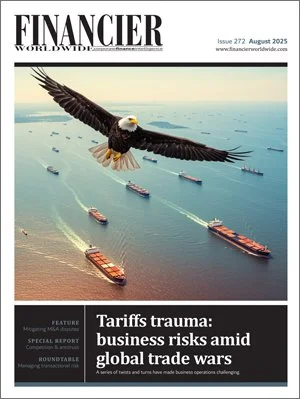US, UK and EU decisions buoy antitrust cartel enforcement in labour markets
August 2025 | SPECIAL REPORT: COMPETITION & ANTITRUST
Financier Worldwide Magazine
A trio of decisions mark a step forward for three antitrust agencies in their campaigns to combat cartel conduct that harms competition in labour markets. In April, the US Department of Justice (DOJ) Antitrust Division secured its first guilty verdict in a criminal wage-fixing case, after announcing in 2016 its intent to criminally prosecute no-poach and wage-fixing conspiracies. In March, the UK Competition and Markets Authority (CMA) released a decision finding, for the first time, labour-market collusion and fining companies for sharing future pay rates and other sensitive information, often with the intent to align pay rates. In June, the European Commission (EC) announced its first labour-market collusion decision and imposed nine-figure fines on two food delivery companies for a no-poach and market-allocation agreement, emphasising how their partial ownership relationship facilitated the violation.
While the conduct ranges from wage-fixing agreements to information exchanges to no-hire or no-solicit agreements, there is a common thread. The antitrust agencies have committed to bringing cartel enforcement to labour markets and, at this stage, have shown an ability to prevail. The outcomes here also show the need for businesses to be as exacting in antitrust compliance when competing for workers as they are when competing for customers. Otherwise, businesses and their executives may end up in the crosshairs of a cartel investigation.
Cartel enforcement in labour markets
For decades, antitrust agencies have treated agreements among competitors to fix prices or allocate markets – collusion or cartel conduct – as the most egregious type of antitrust violation.
Historically, the US has reserved criminal prosecution for price-fixing, bid-rigging and allocation agreements. The EU, UK and other jurisdictions obtained large, punitive administrative fines against companies for cartel conduct. But the agencies’ historical focus was on price-fixing and allocations by competing sellers with the occasional case targeting competing buyers; seldom, if ever, did enforcers target agreements to fix wages or allocate employees. Then, in the early 2010s, the DOJ challenged agreements among several technology companies not to poach employees but reached civil settlements that barred the conduct and included no penalties.
This stance changed in October 2016 when the DOJ announced that “[g]oing forward, the DOJ intends to proceed criminally against naked wage-fixing or no-poaching agreements”, maintaining they “eliminate competition in the same irredeemable way as agreements to fix product prices or allocate customers, which have traditionally been criminally investigated and prosecuted as hardcore cartel conduct”. Between 2020 and 2022, six no-poach or wage-fixing cases were criminally indicted.
Other pronouncements followed. In February 2023, the CMA published guidance on avoiding labour-market collusion, with the agency’s chief executive warning a year later it can “take enforcement action against firms which break the law by fixing wages, just as [it] can act against firms which collude to fix prices”. A May 2024 EC policy brief stressed the seriousness of restrictions in labour markets and asserted that wage-fixing and no-poach agreements have, by their nature, the potential to restrict competition. To date, at least 34 antitrust agencies have indicated their intent to extend cartel enforcement efforts to labour markets.
Initial enforcement efforts falter at trial
Though the DOJ’s first six indicted cases overcame pretrial challenges, none secured a guilty verdict on the antitrust charge. The first case charged a conspiracy to decrease compensation for physical therapists and physical therapist assistants. The “facts of this case do not present those typical of a price-fixing agreement”, the court recognised, but it would not dismiss the case because the alleged “conspiracy among buyers in the labor market to fix the pay rates of the PTs and PTAs” nevertheless qualified as price-fixing. Another court let a case charging an employee-allocation conspiracy through agreements not to solicit employees go to trial, opining that “anticompetitive practices in the labor market are equally pernicious—and are treated the same—as anticompetitive practices in markets for goods and services”.
When these two cases were tried in 2022, the juries found the defendants not guilty on the antitrust charges. In 2023, two more cases were tried, with a jury acquitting in one, and the judge granting an acquittal in the other. Each trial had its own set of idiosyncratic facts and issues, but a pattern emerged: 4-0 against the government. The fifth case yielded a negotiated resolution with an individual avoiding conviction while his company pleaded guilty. The DOJ dismissed the last remaining indictment of the initial six, effectuating a reset and leaving only a later indicted wage-fixing case pending, United States v. Eduardo Lopez.
Major decisions in 2025
In the US case, through texts such as “We all have a mutual agreement that with the pay increase, all 3 companies will stay within the same hourly rate”, Eduardo Lopez allegedly engaged in a conspiracy “to suppress and eliminate competition for the services of nurses employed by the co-conspirator companies by agreeing to fix the wages of those nurses”. As one co-conspirator texted, “We just have to play nice with rates”. Lopez allegedly responded: “Yes. I’m staying with in our agreed rates.” He was charged with the antitrust offence as well as fraud related to the sale of his company. The trial unfolded like a classic price-fixing case: prosecutors elicited testimony from a conspirator now cooperating with the DOJ and from sympathetic nurses, played a secretly recorded conversation with Lopez, and offered texts and other documents as corroboration. On 14 April the Las Vegas jury found him guilty on all counts. While still subject to an appeal, the verdict suggests that the DOJ can indeed prevail in a labour-market case.
In the UK case, one broadcaster emailed another requesting sensitive information: “Our f/l sound assistants are seeking a pay increase and I am doing a ‘ring round’ to check rates… I wanted check where you guys are so that we can align if possible.” According to the CMA, the broadcasters engaged in an unlawful concerted action that harmed competition for freelance workers, like sound assistants, who supported the production and broadcasting of sports content. On 24 March, the CMA released its first labour-market decision, finding this episode and 14 other distinct and brief episodes by five broadcast and media companies each constituted a competition law infringement. From 2014 to 2021, in each episode, a pair of the implicated companies shared competitively sensitive information regarding the hiring and pay of these freelance workers, including future pay rates. In the CMA’s view, this sharing reduced strategic uncertainty and thereby harmed competition in the market for freelancers, and the sharing was often done with the intent to coordinate conduct and align pay rates.
Before the investigation’s launch, one company sought immunity under the CMA’s cartel leniency policy and ultimately received it. The other companies agreed to settle, each admitting the violation, accepting a penalty (£4.2m altogether) and waiving appeal.
In connection with the EU case, Teresa Ribera, executive vice-president of the EC, commented: “[C]ompetition rules aren’t just about keeping prices down. They also protect our freedom to choose, including where we want to work.” On 1 June, the EC announced its decision fining two major food delivery companies €329m for a single, continuous infringement consisting of an agreement not to poach each other’s employees, to exchange commercially sensitive information and to divide between them national markets. The conduct began when one company acquired a minority share in the other. The shareholder’s agreement included a limited reciprocal no-hire clause for certain employees, but months later the companies reached a “general agreement not to actively approach each other’s employees”. The companies admitted their involvement and agreed to settle the case.
The EC declared the decision groundbreaking in two ways. It “is the first time that the Commission is fining companies over a ‘no-poach agreement’”, and “also the first decision that shows how companies can misuse a small stake in a rival company for anti-competitive reasons”. The shareholder relationship provided a channel for them to align business strategies and exchange information beyond what a corporate investor would need. Thus, Ms Ribera cautioned, although “owning a stake in a competitor is not illegal in itself”, its use “to gain insight information and influence decisions in ways that can harm competition” may be “problematic”.
Implications
Expect the 2025 decisions to bolster labour-market cartel enforcement. Indeed, the first speech by the new head of the DOJ’s Antitrust Division cited the “recent Las Vegas nursing case” as an example of helping “defend ordinary Americans who need competition for their work to raise wages and improve working conditions”. Her EC counterpart lauded its own decision as a sign of “our determination to taking actions against all forms of cartels”. The CMA decision was accompanied by an admonition: companies “should set rates independently of each other so pay is competitive”.
Current politics and policy favour further cartel enforcement in labour markets and warrant investing in compliance to avoid collusion in the competition for workers. The risks may not be intuitive. Managers or hiring professionals may prefer an easy course of ‘playing nice with rates’, or aligning compensation via anticompetitive ‘benchmarking’, or not chasing rivals’ talent and protecting their own. But the risks of high fines and criminal sanctions are real. It is essential to assess and mitigate that risk, including evaluating hiring restraints embedded in other arrangements (such as minority investments, outsourcing or collaborations), wage-benchmarking calls, and ‘gentlemen’s agreements’ concerning compensation or targeting restrictions. Conferences, management circles or chatrooms discussing common labour issues create risks of improper side discussions and must be carefully policed. Lastly, investment and other agreements should not serve as conduits for sensitive information to dampen competition in labour or other markets.
James J. Fredricks and Bill Batchelor are partners at Skadden, Arps, Slate, Meagher & Flom LLP. Mr Fredricks can be contacted on +1 (202) 371 7140 or by email: james.fredricks@skadden.com. Mr Batchelor can be contacted on +44 (0)20 7519 7312 or by email: bill.batchelor@skadden.com.
© Financier Worldwide
BY
James J. Fredricks and Bill Batchelor
Skadden, Arps, Slate, Meagher & Flom LLP
Q&A: Navigating dynamic competition in merger control
Shifting gears: a new approach to merger control policy in the UK and US
No deal too small: navigating US and EU scrutiny of below-threshold deals
US, UK and EU decisions buoy antitrust cartel enforcement in labour markets
Antitrust and information exchange: navigating without a safe harbour
The strategic shift in private enforcement of Canada’s competition laws
Legitimate cooperation vs anticompetitive agreements – ‘Green Deal’ or ‘Green Cartel’?
Priorities of the Belgian Competition Authority for 2025: an ambitious programme


